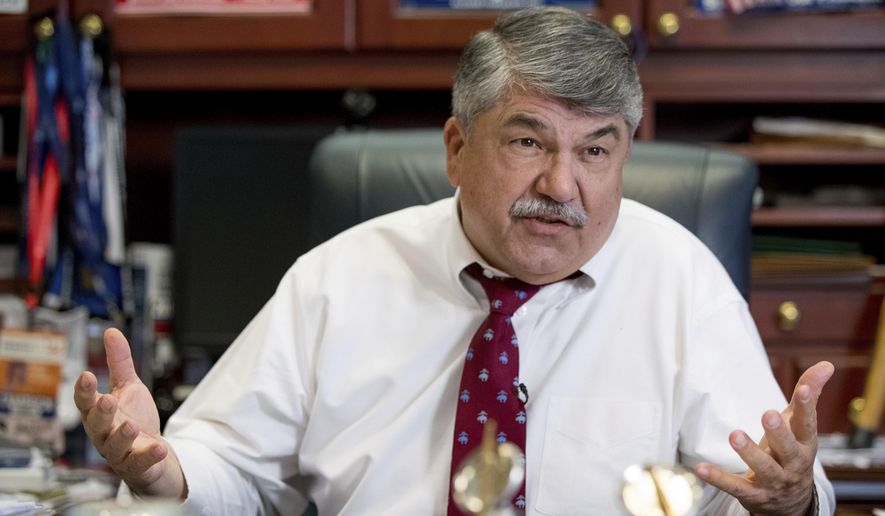Many of the union members who crossed party lines to help swing the election to President Trump are disappointed with his performance in office and returning to the Democratic fold, AFL-CIO President Richard Trumka said Wednesday.
Rank-and-file union members, many of whom backed Mr. Trump in longtime Democratic strongholds across the rust belt that were key to Mr. Trump’s upset win in November — Pennsylvania, Wisconsin, Michigan — were not part of a political realignment but part of an experiment that went awry, he said.
“You’re beginning to see a lot of people come back across the bridge,” Mr. Trumka told reporters at a breakfast meeting hosted by the Christian Science Monitor. “A lot of the optimism has faded.”
Last year’s presidential race exposed a rift between rank-and-file union members willing to pull the lever for an anti-establishment GOP candidate and union leaders who remain intimately tied to the Democratic Party.
Mr. Trumka said the union had set its sights of prodding those voters back across the bridge in the midterm elections next year, hopefully retaking the majority in the House.
The message to union voters in those previous stronghold, which were known as the “Blue Wall,” would focus on Mr. Trump’s failure to deliver on his promises, such as a massive infrastructure bill that has not materialized.
“They voted for Trump because he was going to do this and do that and do that, and he hasn’t done any of that,” he said. “I will give them the information.”
White House officials rejected the Mr. Trumka’s characterization of the Trump presidency that has pursued an agenda that spurred rapid economic growth.
“President Trump was elected to protect American workers, and since the beginning of his administration, he has continued to fight to bring jobs back to the U.S. and renegotiate bad trade deals that have not put Americans first,” a White House aide said on condition of anonymity. “The President will continue to be the President for all Americans, and is committed to ensuring that American workers are prepared to thrive in the skill-intensive jobs of our modern economy.”
Mr. Trumka’s assessment could be wishful thinking. Much of Mr. Trump’s base hasn’t wavered, as witnessed at his recent campaign-style rallies, though polls have shown an erosion of support.
Gallup’s daily tracking poll found that 59 percent of Americans disapprove of the job Mr. Trump is doing, with 35 percent approving. It’s part of a general downward trend for the president in that poll.
Another survey found more than 60 percent of voters in Michigan, Pennsylvania and Wisconsin said they were embarrassed by Mr. Trump’s conduct in office. About 25 percent said they were proud of him.
The NBC News/Marist poll was taken after the unrest at white nationalist demonstration in Charlottesville, Virginia, in which a woman was killed when, according to authorities, a white supremacist drove his car into a crowd of counterprotestors.
At the time, Mr. Trump was widely criticized in the news media for saying there was blame “on both sides” for the violent clashes.
At the start of the Trump presidency, Mr. Trumka voiced tentative support of his agenda for a job-creating infrastructure program, boosting U.S. manufacturing and renegotiating the North American Free Trade Agreement.
The collaboration between labor and the Trump White House was short lived.
Mr. Trumka said the White House faction pushing the populist agenda that won support from blue-collar workers “turned out to be racists.”
The jab was aimed at former White House political strategist Stephen K. Bannon, who championed a populist agenda, but resigned amid West Wing infighting.
Mr. Trumka stepped down from the president’s manufacturing council to protest Mr. Trump’s response to Charlottesville. Several CEOs also quit the council, prompting Mr. Trump to disband it.
Mr. Bannon’s allies described the opposing faction as “White House Democrats.”
Mr. Trumka said the faction that now dominates the White House were “Wall Streeters,” who he said reversed the agenda from what Mr. Trump ran on.
Both labels refer to Mr. Trump’s daughter and adviser Ivanka Trump, his son-in-law and aide Jared Kushner, Treasury Secretary Steven Mnuchin and chief economic adviser Gary Cohn.
Mr. Trumka instead that the union wasn’t a partisan operation.
“It doesn’t matter to me where you come from. If you support working people and our agenda, we will support you,” he said.
Still, he blamed Hillary Clinton, the AFL-CIO pick in the 2016 presidential race, for not having a good enough economic message to win over blue-collar voters.
“They didn’t believe what she was saying,” Mr. Trumka said.
• S.A. Miller can be reached at smiller@washingtontimes.com.




Please read our comment policy before commenting.